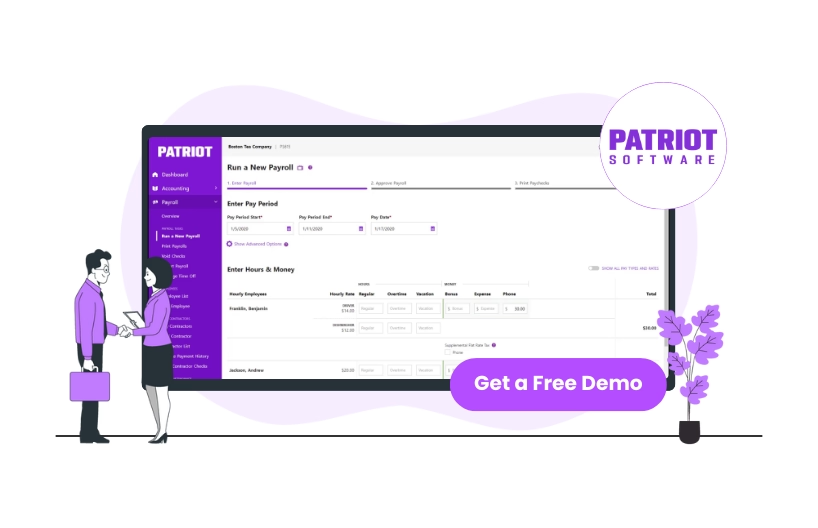
The importance of implementing human resource (HR) software that aligns with your company’s requirements can never be overstated. It acts as a hub for managing all aspects of the employee lifecycle, from recruitment to performance management and beyond.
That said, the real challenge is finding the right HR platform , as there are many options available with each claiming to be the best one. To help you with this, we have selected two prominent names in the HR space: Gusto and Patriot. Both platforms are widely recognized for their robust feature set and ease of use.
Find out which among them better fits your business’s needs in this comprehensive Gusto Vs Patriot comparison guide.
Feature | Gusto | Patriot |
Payroll | Unlimited runs, next-day deposit, global payroll | 3-step process, full-service payroll, 4-day deposit |
Time And Attendance | Integrated with payroll, lacks hardware clock | Add-on, multi-device clock-in/out, real-time tracking |
Compliance | Alerts, HR support, policy resources | Dashboard, auto alerts, resource library |
Reporting | Custom reports, workforce insights | 20+ built-in reports, data sorting/filtering |
Pricing | $40-$180 base + $6-$22/employee, add-ons available | $17-$37 base + $4-$5/employee, discounted for 3 months |

Gusto is a cloud-based platform that streamlines payroll, benefits, and human resource management for small and expanding businesses . The platform offers features such as automated payroll processing, employee onboarding, health insurance administration, and compliance assistance, all designed to simplify complex administrative tasks for employers.
One of Gusto's standout features is its user-friendly interface, which allows businesses to run payroll in just a few clicks. The platform automatically files taxes, assists with compliance, and identifies potential tax credits, helping businesses save money.
Unique Features Of Gusto
Who Are The Main Users Of Gusto?
Gusto is a suitable option for small and mid-sized businesses operating in the following industries and sectors:
Additionally, it caters to single users and businesses dealing with contractors only.
Pros And Cons Of Gusto
Pros
- Supports electronic onboarding, making it easier for new hires to integrate into the system
- Presents a clear breakdown of all expenses, such as taxes, billable hours, etc. , ensuring transparency
- Helps businesses stay compliant with local, state, and federal regulations
Cons
- The reporting feature offers limited functionality
- Does not cater to organizations with complex requirements

Patriot is comprehensive accounting and payroll software that simplifies financial management for small and mid-sized businesses. It offers an intuitive interface to handle tasks like bookkeeping, payroll processing, tax filing, and financial reporting.
The software is widely recognized for its payroll capabilities, enabling businesses to manage employee compensation, tax calculations, and deductions with ease. It also offers optional add-ons such as time and attendance tracking and HR software, providing a comprehensive suite of tools to manage several aspects of business operations efficiently.
Unique Features Of Patriot
Who Are The Main Users Of Patriot?
Patriot payroll software caters to small businesses across various industries and sectors, including:
Pros And Cons Of Patriot
Pros
- Has the capability to automatically manage and process local, state, and federal payroll taxes
- Offers free webinars for users to provide valuable insights and keep them updated on industry trends
- Requires minimal efforts from users to set up and process payroll
Cons
- Payroll processing can take up to four business days
- Managing employee advances and repayments can be challenging and is often prone to errors

On the whole, Gusto is a better option if you are looking for a full-service HR platform with global payroll and advanced reporting capabilities. Patriot, on the other hand, is a better choice if local payroll, compliance, and affordability are your main concerns. Ultimately, it all boils down to your company’s individual requirements.
